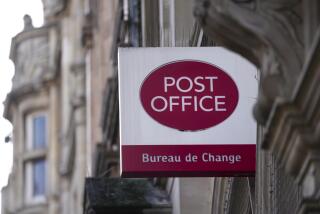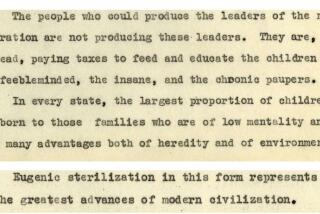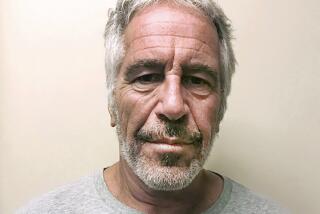Search Opens for Holocaust Claimants
- Share via
What is believed to be the most ambitious effort ever to notify potential beneficiaries of a legal settlement is scheduled to be launched today in California and elsewhere, seeking people eligible for $1.25 billion in Holocaust-related claims.
The worldwide campaign involves the settlement reached last August in a massive class-action suit against Swiss banks accused of withholding money deposited during the Nazi era by Jews and other Holocaust victims.
Advertisements seeking potential claimants will be published in 500 newspapers in 40 countries, using just as many languages, plus Yiddish.
In addition to the advertisements, the notification program, instituted by Jewish organizations and plaintiffs’ lawyers, includes an extensive direct mail campaign, a Web site and a toll-free phone number to help people determine if they are eligible for settlement money.
The number is 1-888-635-5483, and the Web site is https://www.swissbankclaims.com.
Ads will appear in Los Angeles and Latvia, Azerbaijan and Australia, Belarus and Brazil, Chile and the Czech Republic, stressing that people may be entitled to compensation even if they or their families did not have a Swiss bank account. The settlement calls for compensating a broad class of people--Jews and others--who were subjected to Nazi persecution.
Potential claimants have until Oct. 22 to notify a federal court in Brooklyn whether they have any objections to the settlement and whether they wish to opt out. U.S. District Judge Edward R. Korman has scheduled a Nov. 29 hearing in Brooklyn on whether the settlement is “fair, adequate and reasonable.”
New York attorney Judah Gribetz, serving as a special master for Korman, is expected to announce a plan for distributing the funds late in 1999 or early in 2000.
When the settlement was announced last August, some attorneys expressed the hope that the first $250 million could be distributed within a year. But since thousands of potentially eligible claimants are spread around the globe and a number of complicated issues were involved, that goal clearly will not be met.
Elan Steinberg, executive director of the World Jewish Congress, one of the organizations that has played a key role in the Swiss bank campaign, said he expects that distribution of funds will start in the second half of next year. However, Melvin I. Weiss, one of the lead lawyers for the plaintiffs, said he would not predict when distribution would begin.
Nonetheless, both Steinberg and Weiss said the launch of the outreach campaign marks a significant development in the Swiss bank matter, one of several Holocaust reparations issues that has arisen in the past three years.
There are also major class action suits pending on allegedly unpaid insurance claims of Holocaust survivors, as well as other suits seeking compensation for people compelled to work as slave laborers for corporations allied with the Nazi regime. Still other cases seek recompense for people who were subjected to cruel medical experiments in the World War II concentration camps.
The newspaper ads that are to appear today state that the potential beneficiaries of the settlement are “targets and victims of Nazi persecution.” That term includes Jews, Jehovah’s Witnesses, homosexuals, physically and mentally disabled people, people commonly known as Gypsies and people who:
* Had assets on deposit with any Swiss bank or investment before May 9, 1945.
* May have claims against Swiss entities relating to assets looted or taken by the Nazi regime.
* Performed slave labor for entities that may have deposited money derived from that slave labor with Swiss entities or passed profits through them.
* Unsuccessfully sought refuge in Switzerland to avoid Nazi persecution or were mistreated in Switzerland after gaining entry there.
Among the thorny issues facing special master Gribetz is what to do with any funds that are left over after individual claims are paid. There are a variety of proposals circulating on what to do with any residual funds--such as applying them toward Jewish education, resurrecting Jewish communities that were destroyed during Adolf Hitler’s reign and restoring Jewish cemeteries in Eastern Europe.
More to Read
Sign up for Essential California
The most important California stories and recommendations in your inbox every morning.
You may occasionally receive promotional content from the Los Angeles Times.













